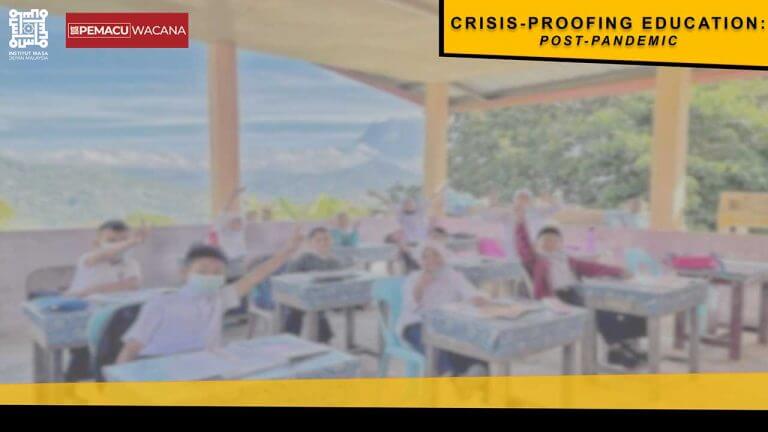A Webinar brought to you by:
Institut Masa Depan Malaysia (MASA)
KUALA LUMPUR, 13 August 2021 – More than 100 Malaysians from all walks of life were present at today’s webinar PEMACU Wacana with the theme “Crisis-Proofing Education: Post Pandemic” organized by Institut Masa Depan Malaysia (MASA).
One of the facets of society that was hit by the pandemic and is still experiencing repercussions is education and learning loss. All aspects of young lives have been impacted and it is not quite over yet for them. Despite challenges and setbacks, learning can and does somewhat continue for some in times of crisis.
However, the pandemic have created the opportunity to change the educational landscape for the better. The pandemic has thought us that we must develop a crisisproof education system if we are to ensure everyone has access to education no matter the situation. Let us not forget our Shared Prosperity Vision which is to ensure no one is left behind.
Bringing with her a wealth of experience as the former Director General of Education, Datuk Dr. Habibah Abul Rahim, a council member of the Majlis Pemulihan Negara and a Senior Fellow with MASA shared the ministry’s efforts and steps taken when the pandemic started to ensure learning continues.
“The future of education is all about strengthening and incorporating student-centric learning. The onus is on teachers to adopt personalized learning and teaching. Flexibility in learning is key in the forthcoming tendency of imparting quality education to students. Considering the added advantages such as flexibility of learning, online will define the future of education for the tines to come. Hence we must also ensure that students are given the access to tools and gadgets essential for digital education” she said.
The world of school also must be linked to the world of work, as skills required at work post Covid-19 have changed. The former Chief Executive of Yayasan Pendidikan Peneraju Bumiputera (YPPB), YM Raja Azura Raja Mahyuddin shared her wisdom and experience on this subject.
She said “Education and employment journey must be treated as a continuum. We need to unleash the students’ potential by understanding their key strengths, motivation and interests at an earlier stage. Life skills must be embedded as part of hands on or action-based learning. With this, relevant skills for future workforce such as digital which is the ability to work in a fully digital environment; cognitive skills for redesigning and innovation; social and emotional skills to drive effective collaboration and expression; and adaptability and resiliency in managing time, boundaries and mental wellness can be honed”.
The third panelist Rachel Francis, Director of Training and Programmes of Myreaders Resources and an alumna of Teach for Malaysia shared startling statistics i.e. 7 out of 10 children are at risk of not being able to keep up with school because they are missing out on early primary education and basic literacy; 8 months have gone by without schooling for the underprivileged students without access to smart devices and internet data for online classes and 4 out of 5 children who have no access to education are from B40 communities.
She said, “When children go back to school, my hopes are that we prioritise students with no access to online learning and we teach students who were unable to access online learning basic navigation of apps used for education. How to log in to their email addresses, how to retrieve passwords, how to log in to Google Classroom, how to switch accounts. All students need to be prepared for a possibility of hybrid learning.”
Meanwhile another panelist Teacher Muhd Shafiq Abdul Aziz from Sekolah Menengah Kebangsaan Mata Ayer, Kangar, Perlis and Adiwira JPN Perlis 2019 shared his experience of PdPR teaching having moved from an urban school to a rural school.
He mentioned “During PdPR1.0 it was as struggle for both students and teachers as exposure to online teaching was limited. PdPR 2.0 became smoother as teachers and students had begun to understand on how to utilize the platform on learning with a lot of help from the government and NGOs. The current PdPR 3.0 is now has become a norm. Gamification is an essential tool to attract student attention in virtual learning”. He also mentioned that teachers are using everything they must to make sure students are not left behind, in fact, teachers are now given courses on how to use Tiktok, which is the language of our kids today.
The event was moderated by Sharizal Shaarani, a serial entrepreneur and prolific host on Clubhouse. He concluded, “Education is a personal topic to all Malaysians. This crisis presented to the world has given us an opportunity to renew and evolve our education system. But are we doing enough, and can we reduce learning loss even faster? Evident from the today’s sharing and feedback, much has been done, however what is lacking is the narrative and communication. We need to communicate this together on addressing to address learning loss and learning poverty; and on how we renew our teaching and learning pedagogy and education system?
Summarizing the event, organizer Tunku Azela Tunku Aziz, Interim CEO of MASA reiterated conversations on learning loss and crisis proofing the education system is timely and should continue so that the rakyat knows that these issues are being deliberated and addressed so as to alleviate the anxiety.
Tunku Azela invited those who are interested in the same cause to participate in MASA’s upcoming public programmes by visiting www.institutmasa.com or through social media on Facebook and Instagram @institutmasa.
~End~
The recording of the live webinar is available at https://institutmasa.com/videos/.
For media enquiries, please contact:
Ms. Farrah Ezrina
Manager, Programme Management
+6 010-220 0460
farrah.ezrina@institutmasa.com
